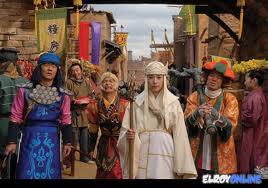The Magic of Monkey August 2, 2013
Author: Beach Combing | in : Actualite, Contemporary , trackback

Monkey (aka Monkey Magic) was a Japanese series originally broadcast in two seasons: 1978/1979 and 1979/1980: there are 52 episodes. It was based on the famous Chinese novel describing Xuangzang’s journey to India with four guardians: a pig god, a monkey god, a fish god (think undine with skull bracelet) and a dragon who has been successfully turned into a horse. But the parallels with the book are, perhaps thankfully, superficial: not that we’ve got anything against seventeenth-century Chinese literature, per l’amore di dio….
So why should anyone care? Well, Monkey represents a kind of pre-fall Japanese kitsch, effortlessly combining bad martial arts with ham Buddhism. And yet somehow, somehow the program worked. The casting was inspired: the role of the Chinese monk (Tripitaka) was given to the beautiful Japanese actress, Masako Natsume, who was to die just five years later of leukemia. (Those who the gods love…) The fact that the producers of the series were ready to make that initial transvestite choice, boded well and they managed to get several other worthwhile extroverts on board including Masaaki Sakai, a rock singer as ‘bad’ Monkey, Toshiyuki Nishida as Pigsy (perhaps the single most memorable character, who turned into a pig whenever he found a woman attractive) and Shiro Kishibe (the fish man, Sandy), another ex-rock star.
Each programme, apart from some tedious bookends where things actually happened, was formulaic and hence predictable. Tripitaka and the boys strode into town on their way to India. There they would be greeted by some terrified villagers, who normally had a demon living in their midst. (Costume standards were very bad for the demons even by the standards of late 1970s in Japan). The boys would then fight the demons, while Tripitaka cautioned against excessive zeal and violence: there was some cheesy music whenever Tripitaka began to talk about not hitting people. Then the show would end with the little party walking off towards the sunset with a ‘wise’ Buddhist sentence thrown in. The programs understandably blurred, but Beach remembers one final scene where a mountain appeared in a crooked pan shot and there was some theology fodder about climbing to the top: then ‘Monkey is a god, immortal and magic, but he is less than the Buddha in you…’ The paralysed could rise from their beds watching this nonsense. It was SUBLIME. Probably the closest in the western tradition is that great Roman novel The Golden Ass describing the adventures of man who has been turned into a donkey as he travels across the country, getting in and out of scrapes, on his way to union with the great mother. She is waiting for us all…
Monkey, Pigsy and Sandy were rather curious beings. They are sometimes described as gods and sometimes as elementals. Beach likes to think of them as eastern fairies: and watching some of these episodes with his eldest daughter in the last few days there is maybe some justification for this. (Or is this nonsense: drbeachcombing AT yahoo DOT com) Perhaps best of all they run around and taunt each other like eight-year-old children, apart from Sandy who is more like a precocious fourteen year-old who has just discovered that it is cool to wear black and moon around in his bedroom. If any of this is exciting you there are some opportunities out there to watch it all: Beach has to say though that he is not an expert on copyright law and that you should make sure that you are respecting local legislation.
Not the least interesting thing about Monkey is that it was most successful, not in Japan, but in the English-speaking world. The key? The BBC (i) chose not to subtitle but to dub, a rare choice at that date and (ii) they put together a brilliant dubbing team who spoke in absurd ‘oriental’ accents. Today this would probably get the BBC prosecuted under the Race Relations act. Back, then, it was simply charming and in line with the ‘loud’ feel of the show. In the UK and, above all, in Australia Monkey marked a generation. As one BBC article puts it: ‘Say the two words ‘Monkey Magic’ to a man in his late 30s and he’ll turn into a child, putting on a funny voice and then moving his lips in exaggerated fashion.’ And why include it on a history website? Well, today is the first day of wifeless, childless writing holidays and Beach was feeling a bit lyrical and wondering how he could productively waste his time. Oh, you want a taste? Well, here’s the opening theme (which tells you all you need to know); and the closing theme, and a couple of clips. Then, here is a recent remake, which reminds Beach of the Hollywood version of Chicken Little at the end of Chicken Little. This will only make sense if you’ve seen Chicken Little.
17 August 2013: Ray G, an old friend of this blog writes in: I think that’s a slightly harsh assessment. The Monkey series ‘jumped the shark’ plot-wise well before it finished, but a deal of its distinctive content was highly authentic to source. For instance, Monkey’s powers, shapeshifting, the variable-sized staff that could fit in his ear, the magic headband, the magic cloud, the ability to make his hairs transform (into more monkeys, swords, etc) … and that episode of pissing on Buddha’s hand. I did rather like the cartoon portrayal (done by the animators for Gorrilaz) they used for the Monkey-themed BBC advertising for the 2008 Olympics: Thanks Ray!


